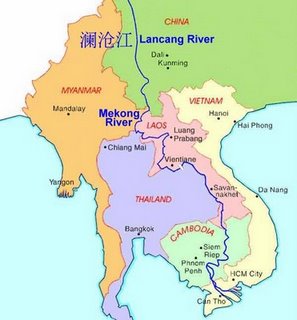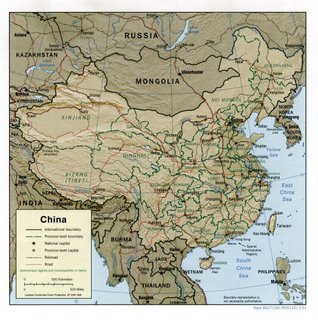

As I noted in April 2006, China is looking for alternate pathways to get oil from source to user. One route is the Mekong River:
China wants to import Mideast oil through the Mekong River to avoid the unsafe Malacca Strait. As an oil shipping route it is already operational but there are strong environmental concerns that accidental spills could adversely affect the livelihoods of nearly 60 million people living along its banks.Planning ahead in case the U.S. decides to help defend Taiwan by cutting off the Strait of Malacca to them?
Two Chinese ships made their maiden journey on December 29 carrying a total of 300 tons of refined oil up the Mekong. The two vessels arrived at a port in China's south-western province of Yunnan with a cargo that was shipped from a port in Thailand's northern province of Chiang Rai, China's state news agency Xinhua reported.
China’s estimated total annual oil imports have now reached 140 million tonnes per year, and about 75 per cent currently flows through the narrow, pirate-infested Strait of Malacca.
Piracy is not the only perceived vulnerability though. Beijing has also concerns that in a potential conflict with US fuel shipments through the waterway could be choked off, hence the importance of the Mekong. (emphasis added)
Betting that the U.S. would find it hard to put 60 million people at risk by stopping up the river?
Freeing up their hands to take action?
UPDATE: Previous post on Sea lanes. Here is a link to an article titled, "The Oil Weapon: Myth of China's Vulnerability." Another analysis here. More here:
According to the Washington Times, China understands that the principle national security threat facing it is disruption of sea lanes bringing oil and commerce to its shores.The Bill Gertz piece noted says:
China believes the U.S. military will disrupt China's energy imports in any conflict over Taiwan ... Beijing's leaders see access to oil and gas resources as vital to economic growth and fear that stalled economic growth could cause instability and ultimately the collapse of their nation of 1.3 billion people. Energy demand, particularly for oil, will increase sharply in the next 20 years — from 75 million barrels per day last year to 120 million barrels in 2025 -- with Asia consuming 80 percent of the added 45 million barrels, the report said. Eighty percent of China's oil currently passes through the Strait of Malacca, and the report states that China believes the sea area is "controlled by the U.S. Navy." Chinese President Hu Jintao recently stated that China faces a "Malacca Dilemma" -- the vulnerability of its oil supply lines from the Middle East and Africa to disruption. Oil-tanker traffic through the Strait, which is closest to Indonesia, is projected to grow from 10 million barrels a day in 2002 to 20 million barrels a day in 2020, the report said. Chinese specialists interviewed for the report said the United States has the military capability to cut off Chinese oil imports and could "severely cripple" China by blocking its energy supplies.See also here.
UPDATE2:
 Looking at this map, I wonder about the Mekong as an alternate to the Strait of Malacca (since I'm a little fuzzy on how oil tankers get to the Mekong without transiting a couple of major chokepoints). However, it is an excellent alternative to the Taiwan Strait and the South China Sea, if need be.
Looking at this map, I wonder about the Mekong as an alternate to the Strait of Malacca (since I'm a little fuzzy on how oil tankers get to the Mekong without transiting a couple of major chokepoints). However, it is an excellent alternative to the Taiwan Strait and the South China Sea, if need be.
UPDATE3: Tankers do not actually have to get to the Mekong from the Middle East if there is some sort of transport from Thailand or Burma such as a pipeline, as was proposed at one time. See here.

No comments:
Post a Comment